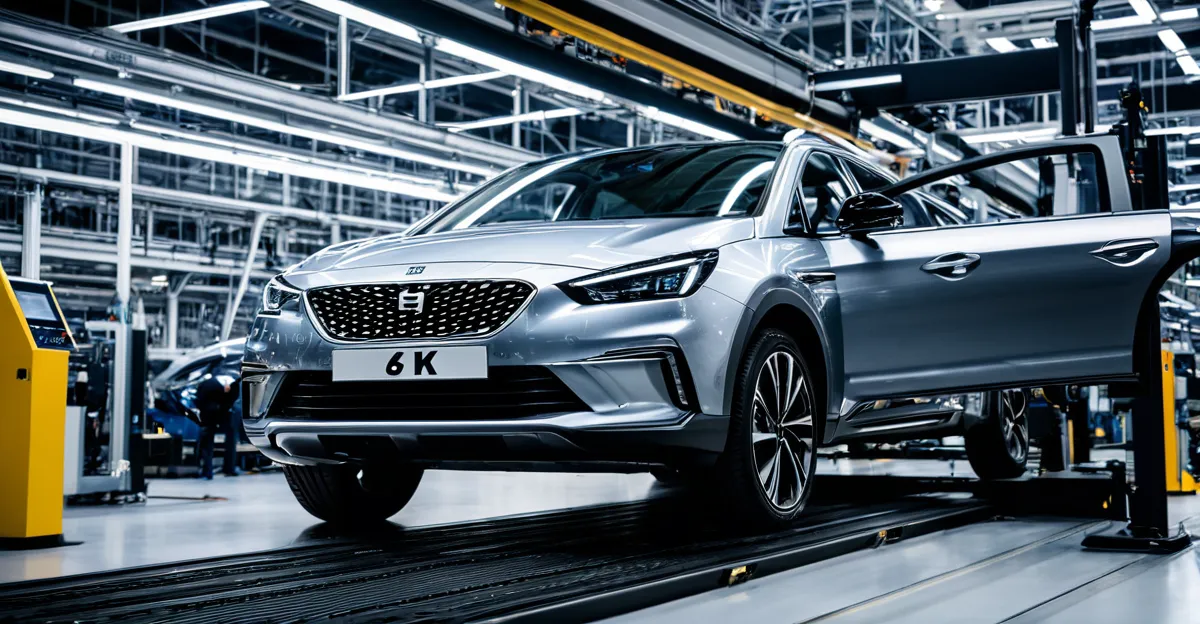Impact of Advancing Technology on UK Automotive Manufacturing Efficiency
Advancing technology in UK automotive industry has significantly boosted automotive manufacturing efficiency by transforming traditional processes. Automation and robotics serve as core drivers, enabling faster, more precise assembly line operations while reducing human error. Robots handle repetitive and intricate tasks, allowing human workers to focus on quality control and innovation.
Artificial Intelligence (AI) enhances efficiency with predictive analytics and process optimisation. AI systems monitor production lines, forecast equipment failures, and suggest timely maintenance, reducing downtime and improving overall productivity. Meanwhile, the Internet of Things (IoT) facilitates real-time data collection across manufacturing sites, enabling informed decision-making and streamlined supply chain management.
In parallel : What impact does the UK’s automotive industry have on the national economy?
This manufacturing innovation leads to improved quality control by identifying defects early and ensuring consistency throughout production. Additionally, automation, AI, and IoT collectively lower operational costs. Reduced manual labour, minimised waste, and energy-efficient practices contribute to cost savings essential for UK automotive competitiveness. Increasing adoption of these technologies illustrates a clear trend: as they evolve, so too does the potential for drastically enhanced efficiency in UK automotive manufacturing.
Key Technologies Transforming UK Automotive Factories
Advancements in automation in automotive manufacturing are central to boosting efficiency. Robotics now dominate assembly lines, performing precise, repetitive tasks with speed unmatched by human workers. This integration reduces errors and accelerates production cycles significantly. For example, robotic arms install components consistently, ensuring uniform quality while freeing human employees to oversee complex tasks.
Also to discover : What is the impact of 5G on the UK automotive industry?
Artificial intelligence (AI in automotive) plays a vital role beyond automation. AI-driven predictive maintenance analyses sensor data to anticipate equipment failures before they occur, preventing costly downtime. Furthermore, AI optimises process flows by adjusting operations based on real-time input, enhancing throughput and resource use.
The Internet of Things (IoT in car manufacturing) complements these efforts by providing continuous monitoring across facilities. Embedded IoT sensors collect data on machine performance, environmental conditions, and supply chain logistics. This real-time visibility enables manufacturers to make swift decisions, minimise disruptions, and streamline inventory management.
Combined, robotics in manufacturing, AI, and IoT form a smart ecosystem that redefines UK automotive plants. These technologies create the framework for responsive, efficient, and high-quality production environments that keep UK automotive manufacturing at the forefront of global innovation.
Practical Impact: UK-Based Case Studies and Industry Examples
Exploring UK car manufacturing reveals clear evidence that embracing technology adoption UK automotive boosts efficiency profoundly. Major UK manufacturers have integrated automation and robotics on factory floors, resulting in significant productivity improvements. For example, a smart factory in the Midlands reported a 25% increase in output following the installation of robotic assembly lines coupled with AI-driven quality control systems.
Such manufacturing case studies consistently highlight how combining technologies accelerates production while lowering errors. In one facility, IoT-enabled sensors provided real-time data that enhanced supply chain responsiveness, preventing costly delays. These sensors also helped optimise energy consumption, aligning with sustainable manufacturing goals.
Another key factor is collaboration between technology firms and automotive companies in the UK. This synergy drives innovation by tailoring solutions to specific factory challenges. For instance, joint projects have introduced predictive maintenance tools powered by AI, which minimise downtime and reduce maintenance costs.
Together, these examples illustrate how practical deployment of advanced technology transforms UK automotive factories into efficient, resilient, and competitive entities. The consistent growth seen in these smart factories UK serves as a model for others aiming to embrace digitalisation and reap tangible benefits in efficiency and cost management.
Recent Technological Advancements and Trends in UK Automotive Manufacturing
Technology in UK automotive industry is rapidly evolving under the influence of Industry 4.0 UK principles, with smart manufacturing trends reshaping factories. Recent automation advances include collaborative robots that work safely alongside humans, enhancing flexibility and precision on assembly lines. These robots reduce physical strain and boost efficiency by adapting to various tasks without major reconfiguration.
Artificial Intelligence (AI) is now integral to digital transformation UK automotive efforts. AI-powered systems leverage vast data to optimise production dynamically, improving throughput and reducing waste. Predictive analytics guide proactive maintenance schedules, minimising costly downtime and elevating manufacturing efficiency overall.
Sustainability has become a significant focus within these trends. Factories are adopting energy monitoring technologies and green robotics, which lower environmental impact while maintaining performance. For example, energy-efficient motors and IoT sensors track power consumption in real-time, enabling better resource management aligned with environmental goals.
Digital twins, virtual replicas of physical systems, are expanding across UK automotive manufacturing. These models simulate production processes, allowing manufacturers to test changes and predict outcomes before implementation. This approach accelerates innovation and supports continuous improvement, demonstrating how manufacturing innovation drives future-ready factories embracing smart, data-driven strategies.






